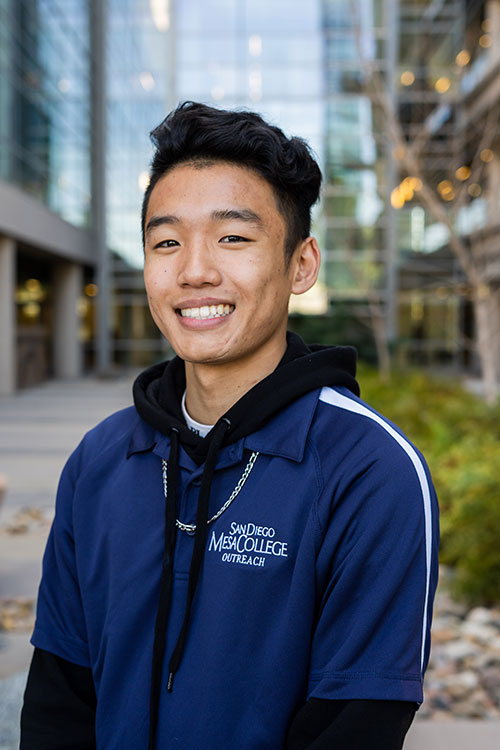Even with the San Diego Community College District (SDCCD) providing thousands of laptops for students on the other side of the digital divide. Even with the district’s colleges and Continuing Education distributing thousands of Coronavirus Aid, Relief, and Economic Security (CARES) Act emergency grants to students who suddenly found themselves out of work, it has been a struggle. In fact, surveys show the primary challenge SDCCD students face are financial, with more than half saying they are suffering a loss of income because of the pandemic and one in four saying they can’t afford to pay their rent, mortgage, or utility bills.
Economic factors are among myriad reasons enrollment at community colleges nationwide dropped 9.4% this fall compared to last year and plummeted 22.7% among first-year students, according to a new report from the National Student Clearinghouse Research Center. Enrollment across the SDCCD is down 8% this fall compared with fall 2019.
We talked to several students for a more personal look at how they have been impacted by recent events. Here are stories from a few.
Xenia Brady

The economic wreckage wrought by the COVID-19 pandemic placed San Diego City College Honors student Xenia Brady in dire financial straits. The 30-year-old literature major planning to transfer next fall to University of California, Los Angeles was out of a job as a bartender at catered events for several months.
“I was working 30-hour weeks making decent money with tips, but weddings weren’t a thing anymore, corporate events weren’t happening, baby showers, parties, they all dried up,” she said.
It was quite a turnaround for the hardworking scholar who has been part of the Preparing Accomplished Transfers to the Humanities (PATH) program and who has aspirations to become a high school English teacher.
Brady returned to college seeking better career prospects after working in customer service for a travel insurance company. “I really didn’t see a future in it so I decided to go back to school,” she said.
City College is within walking distance of her home, making her familiar with the campus, so she enrolled. After finding her passion for literature from mentors such as Professors Jim Miller and Kelly Mayhew, Brady was all set on the path to becoming an English teacher.
Her plans, and those of many other students, nearly unraveled when the pandemic hit.
“I know people who are using their cell phones to Zoom into class and write their papers,” she said. “You’d walk into the library pre-COVID and pretty much every computer was being used by people who lacked a laptop or didn’t have WiFi access. But the libraries are closed now. Students are hurting.
“There’s a bit of despair with everything. The economy. Politics. Education. I’m not sure where this is going to go.”
Fortunately, in the up-and-down world of COVID-19, things are starting to look up again. Brady has been back to bartending — “in a modified fashion” — and working as a prep cook since the beginning of October.
“I’m not sure if things will stay this way,” Brady said, “but I’m grateful to be employed again.”
Darien Duong

Mesa College student Darien Duong can tell you all about the financial impacts from the COVID-19 pandemic. Duong, who was working a total of 35 hours per week at his jobs as a 24 Hour Fitness sales representative and a Mesa College student ambassador before the pandemic hit, was laid off from the health club, reducing his weekly income by more than half. As if that weren’t enough, Duong’s father, a painter and home renovation tradesman, has seen his work dry up.
“We had to cut down on our expenses,” he said. “It hasn’t been easy, but we have been getting by.”
Duong said he has been helped through $500 in CARES Act funding distributed by Mesa College and through food drives at the campus. In addition, Duong is enrolled through the San Diego Promise, which covers a student’s first two years of tuition, along with providing book grants.
“I know people who have it worse,” he said. “Some people are really struggling financially and are leaving college or at least thinking about leaving college.”
Despite the challenges, his resolve to complete his studies, earn an associate degree in radiology, and embark on a career as a radiologic technician hasn’t waned.
“You have to be persistent; you have to stay committed and keep your focus,” said Duong, 19, who lives in La Mesa. “You can’t underestimate the value of a good education if you want to get a good job.”
There also have been some benefits among the chaos for Duong. “Before, I was working two jobs, going to school full time; it was always, go, go, go. For me now, it’s kind of allowed me the time to take a step back and focus on mental health.”
Ella Buchanan

Miramar College student Ella Buchanan lost three jobs and watched as a roommate opted to move out of their Mira Mesa apartment at the height of the COVID-19 pandemic, leaving no one with whom to share the rent and utilities. Today, Buchanan is slowly putting the pieces back together, refusing to let anything get in the way of her transferring to the Wharton School of Economics at the University of Pennsylvania next fall.
“Between the CARES Act funding, which helped pay the rent, and a book grant, Miramar has been very supportive and very helpful,” said Buchanan, an Honors Program student attending college through the San Diego Promise. “But it’s been tough. It’s been a challenge.”
That challenge began in March. Buchanan was working as an AVID tutor at Westview High School in San Diego when the campus, like all public schools in California at the time, closed. Buchanan, 19, was able to land two part-time jobs — one at a yogurt shop, the other at an interior design company — but before long, those jobs were gone, too. Making matters worse, her roommate moved out.
After living on edge for four months, Buchanan was hired back recently at Westview High School and landed another tutoring gig at Black Mountain Middle School.
“It’s getting better, I’m working again and I’m getting a new roommate, but I don’t know how much people understand the challenges,” she said.
Among them: “The most important message for people to acknowledge is that there are gaps, especially through FAFSA. My parents, for example, are financially fine, but I’m financially independent. Yet as far as FAFSA is concerned, my parents’ income determines what kind of assistance is available to me, so I’ve received almost nothing in financial aid. That makes no sense. I’m also ineligible for programs like CalFresh and unemployment. I’m not the only person who has been struggling.”
